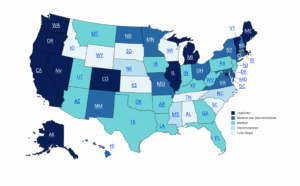On Oct.1, the Lawyers’ Committee for Civil Rights Under Law released the Post-Cannabis Conviction Toolkit, a resource attorneys and advocates can use to determine if their state allows expungement for those with cannabis-related convictions. The toolkit also provides a comprehensive overview of the three main approaches states can take to begin to repair the social, political and economic consequences of marijuana-related criminal records.
While several states have already moved to decriminalize marijuana, and many others are following their lead, Black Americans and other marginalized communities still cannot obtain the post-conviction relief they deserve. As a result of the War on Drugs, these groups have disproportionately been arrested and sentenced on charges relating to marijuana. A prior marijuana conviction is a major barrier to accessing the much-needed opportunities and resources to advance their quality of life, leading to a continuous cycle of economic hardships. These individuals cannot receive public benefits, apply for student loans or secure a well-paying job.
“The Post-Cannabis Conviction toolkit was created to address the racial disparities that remain as a result of the war on drugs,” said Tianna Mays, senior counsel on the Criminal Justice Project. “Individuals with cannabis-related charges can find themselves barred from the community to which they once belonged, facing obstacles with education, housing, and vocation. The toolkit works to educate the individuals with these charges, advocates, and attorneys on the steps that can be taken to eliminate the barriers surrounding post-cannabis conviction.”
Depending on the situation, sealing or vacating conviction records might prove to be more beneficial than expungement, and the toolkit provides descriptions of when it is best to use each of the three avenues. Though marijuana remains illegal federally, states have their own laws regarding these tools.
The toolkit also contains a section for special concerns for vulnerable populations such as immigrants and those facing socioeconomic constraints. Expunging, sealing, or vacating a record for an immigrant or undocumented person can be extremely dangerous. The consequences can be long-term detention, loss of lawful status, possibly even deportation. Those who have socioeconomic constraints are typically those living in poverty, which tends to be Black Americans. Moreover, this toolkit highlights the importance of understanding the constraints these people face as well as the best approach to handle post-cannabis conviction.
The national Lawyers’ Committee is working closely with coalition partners and local partners on the ground to make sure the information in the Post Cannabis-Conviction Toolkit reaches the attorneys and advocates who represent these marginalized communities. Educating them on the steps they can take to expunge, seal, or vacate a marijuana conviction is essential. It is also crucial that advocates are exposed to this toolkit in order to learn about ways they can push for state-level cannabis reform.
The national Lawyers’ Committee is also working to ensure the Marijuana Opportunity Reinvestment and Expungement (MORE) Act, a comprehensive cannabis reform bill, is signed into law. Unfortunately, a vote on the bill has been pushed until after the election. In the meantime, it is important that states take reform into their own hands at times when the Federal government cannot. The assistance of attorneys and advocates in pushing for state level reform will go a long way.
 “States and local advocates have done a great job at trying to move when federal government is unable to help,” Mays said. “But delaying the MORE Act presents continued harm as it yet again delays the necessary access to resources, housing, education, and loans the members of these marginalized communities are in need of. If the MORE Act does not pass, it will continue to send a signal that these communities and this issue are not important. It will continue to send the message that certain people are not invested in the success of everyone, especially those people who are a part of marginalized communities.”
“States and local advocates have done a great job at trying to move when federal government is unable to help,” Mays said. “But delaying the MORE Act presents continued harm as it yet again delays the necessary access to resources, housing, education, and loans the members of these marginalized communities are in need of. If the MORE Act does not pass, it will continue to send a signal that these communities and this issue are not important. It will continue to send the message that certain people are not invested in the success of everyone, especially those people who are a part of marginalized communities.”
View the full toolkit here.


